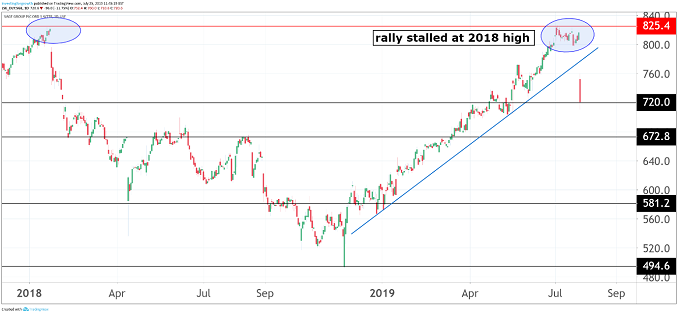Sage disappointment triggers shareholder exodus
Its strategy is working and the shares trade at a discount to peers, so is this a chance to buy?
25th July 2019 14:34
by Graeme Evans from interactive investor
Its strategy is working and the shares trade at a discount to peers, so is this a chance to buy?

Having reaped the rewards of a 35% share price rally in 2019, investors in accounting software group Sage (LSE:SGE) didn't need much encouragement to lock in profits today.
The Newcastle-based company, whose turnaround has been built on a transition towards cloud-based subscription services, triggered the sell-off with a third quarter performance that disappointed in some areas.
The downside came from the older model of software and software-related services, with nine-month revenues down by 15.5% to £195 million. An even weaker quarter is in prospect for the final period of 2018/19, with the overall group full-year margin towards the low end of the guidance range of between 23% and 25%.
Shares retreated 11% to 724p, even though Sage said recurring revenues based around the software subscription model are running slightly ahead of full-year guidance of 8%-9% growth. This follows a rise of 10.6% in the nine-month period, helped by HMRC's push on digital tax submissions attracting customers to the latest version of software.

Source: TradingView Past performance is not a guide to future performance
Overall, analysts at Exane BNP Paribas said today's results were further evidence that the company's strategy is working. They added that Sage was still trading at a deep discount to other subscription-based software vendors, meaning an acceleration of the current transition had the potential to trigger a shift in the valuation multiple.
For the moment, investors appear reluctant to push the stock beyond the 818p record seen in January 2018. This peak was followed by a disastrous few months for the company and its share price after two profit warnings and the departure of CEO Stephen Kelly.
Sage shares were trading at 526p by October before a recovery under the leadership of Steve Hare. Analysts at Jefferies maintained their price target of 825p following today’s update, which they said marked the continuation of the strong performance seen in the first half of the year.
They added:
"While the revised underlying earnings guidance is somewhat disappointing, we believe strong recurring revenue growth in the period is enough to overlook a soft downgrade to margins."
Jefferies pointed out that the phasing detail of the UK's Making Tax Digital initiative meant the fourth quarter was unlikely to benefit to the same extent. In total, the broker said the campaign was likely to add £50 million in recurring revenues.
Morgan Stanley upgraded its forecast for recurring revenues in the 2019 financial year to 9.7% from 9.2%, but pared expectations for 2020 to 7.5% due to questions over whether current tailwinds will remain as strong.
Analysts at Stifel have a 'hold' recommendation and price target of 771p, which is based around a 2019 price/earnings (PE) multiple of 27.7x. They said:
"Sage's ambition - to be a great Software as a Service company - is thus far unfulfilled but the building blocks are there."
Sage trades with a forward 2.1% yield and has lifted its dividend pay-out every year since it entered the FTSE 100 index in 1999.
These articles are provided for information purposes only. Occasionally, an opinion about whether to buy or sell a specific investment may be provided by third parties. The content is not intended to be a personal recommendation to buy or sell any financial instrument or product, or to adopt any investment strategy as it is not provided based on an assessment of your investing knowledge and experience, your financial situation or your investment objectives. The value of your investments, and the income derived from them, may go down as well as up. You may not get back all the money that you invest. The investments referred to in this article may not be suitable for all investors, and if in doubt, an investor should seek advice from a qualified investment adviser.
Full performance can be found on the company or index summary page on the interactive investor website. Simply click on the company's or index name highlighted in the article.